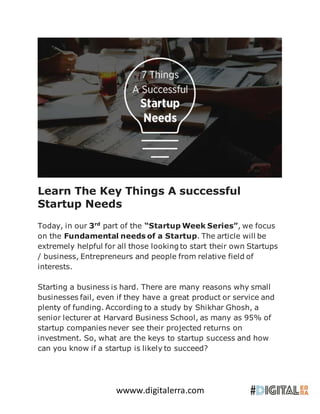
Learn the key things a successful startup needs
- 1. wwww.digitalerra.com Learn The Key Things A successful Startup Needs Today, in our 3rd part of the “Startup Week Series”, we focus on the Fundamental needs of a Startup. The article will be extremely helpful for all those looking to start their own Startups / business, Entrepreneurs and people from relative field of interests. Starting a business is hard. There are many reasons why small businesses fail, even if they have a great product or service and plenty of funding. According to a study by Shikhar Ghosh, a senior lecturer at Harvard Business School, as many as 95% of startup companies never see their projected returns on investment. So, what are the keys to startup success and how can you know if a startup is likely to succeed?
- 2. wwww.digitalerra.com There are some things that entrepreneurs can do to help boost the likelihood of success and here they are! 1. Product Your product must cater to the unmet needs of your customers. Stay laser-focused on solving that problem and don't confuse the solution with a lot of additional features or messaging that confuse or dilute the value of what you're providing. Sometimes that simplification comes in the form of fewer manufacturing steps in order to make producing a product easier and more cost effective. The costs (monetary, learning curve, disruption) all need to be low enough that there is still a net value to taking up your solution, compared to the nearest alternative (value = benefit-cost). 2. Customers Fundamentally you need to start by identifying a prospective customer and an unmet need or desire that the market has not sufficiently addressed. You need to find your customer-base and ideally your choice of customer will represent a market that matches your own needs and ability. Think both in terms of satisfying a need and whether this is the right market for you to address. 3. Willingness to Adapt Successful startups are flexible. They can sense the trade winds of the marketplace and learn to adapt along with them. They need to watch and learn from customers, competitors, and even developments in other industries to find better ways to deliver valuable products and services.
- 3. wwww.digitalerra.com Sometimes adaptation means more than simply improving an existing product and service. It might mean expanding product offerings or exploring new areas. It might even mean throwing out the original plan and coming up with something new altogether. Ultimately, knowing when and how to change focus in these ways is crucial for flourishing as a startup company. 4. Your business on Cloud Here we are talking specifically about cloud computing. Obviously, technology is a big need (and cost) for startups, but these days, cloud services are particularly necessary for a number of reasons. Startups need to think about how best to protect their digital business assets, like using a hosted private cloud for document storage, offsite backups, and other on-demand applications. Cloud services are customizable to meet a startup’s specific business needs, and they are scalable to allow for seamless growth when expansion is necessary. In the highly interconnected world of today, cloud services can provide much of the technological heavy lifting startups require. 5. Funding for the Future Making your entire processes run requires money. Whether it’s in the form of loans and credit lines or dedicated backers like a venture capital firm, startups need access to some form of capital to build a foundation for their business, especially before they start making any sales or charging any fees. There are far too many variations and options on how to get funding to cover them all. In general, successful startups need to
- 4. wwww.digitalerra.com make hard and honest calculations to ensure they don’t overextend themselves. Balancing the need for funding with an appropriate estimation of how much a product might be expected to earn is perhaps one of hardest but best thing to know for a startup. 6. Attracting the Right People Finding the right flock of people to help create and operate a startup is critical to ultimate success. Success means growth all around, with new positions being created as individual tasks become too big for a startup’s founder(s) to complete on their own. Finding competent, knowledgeable people who have the enthusiasm to offer new insights and improve the business model is absolutely essential to success. 7. Timing Every market has a lifecycle, and every opportunity thus has a limited window of time before it expires. In the beginning of a new innovation, markets are easy to enter, and a technical solution is the primary challenge. Anyone who can solve the problem can find opportunity. Conversely, there is also a risk in being too early to a market, since chasing unproven markets can lead to dead ends, or worse, a viable opportunity that will not bear fruit for years to come. The typical startup is best served with a "fast follower" strategy, where you identify a new interest by a set of customers that is already occurring. Conclusion Every startup that wants to establish itself as a respected brand will need to focus on all of these factors at a bare minimum.
- 5. wwww.digitalerra.com Figuring out these key elements will put any startup in a good position to grow into a thriving business.
